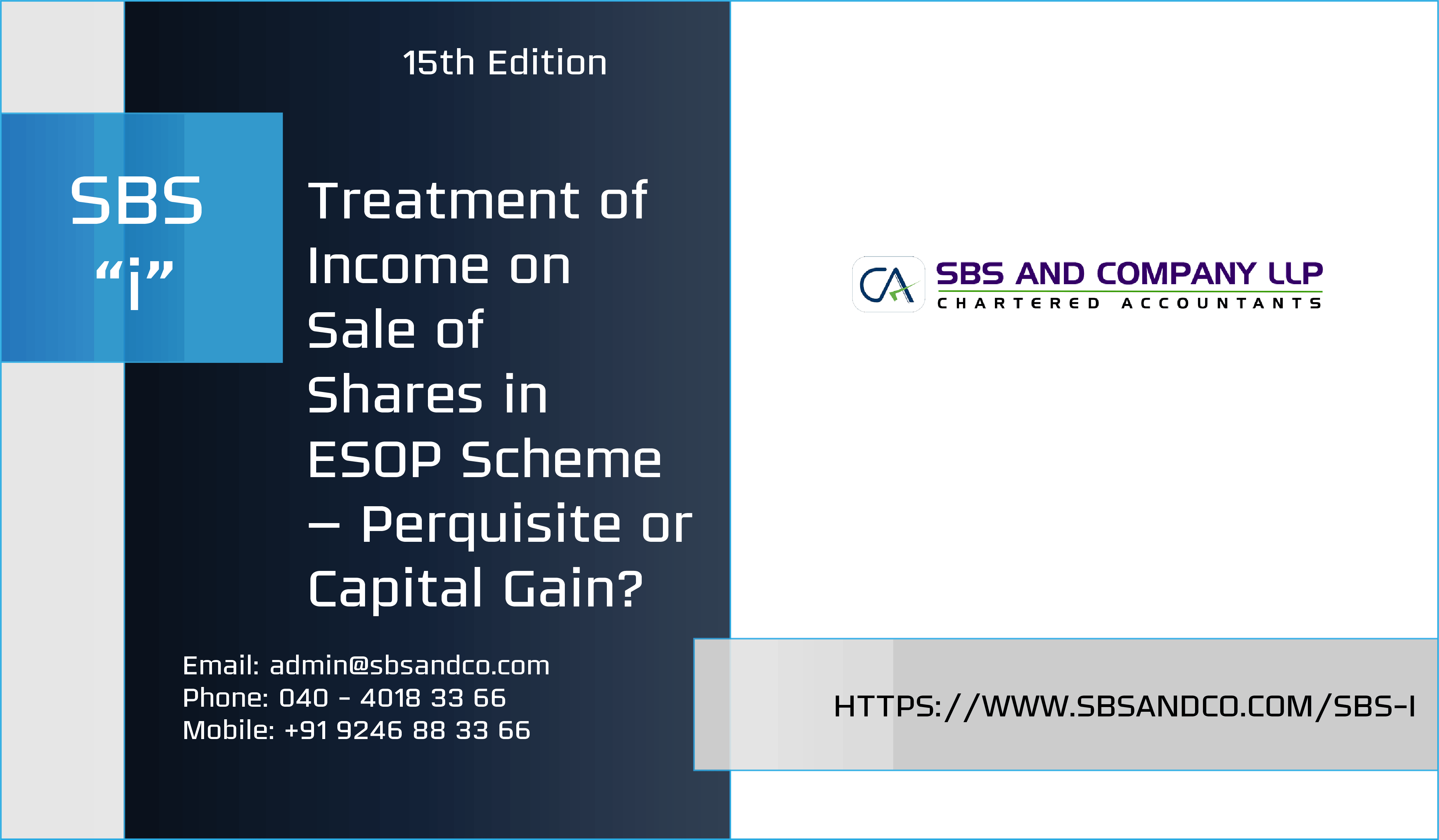Treatment of Income on Sale of Shares in ESOP Scheme – Perquisite or Capital Gain?
Legislative Background:
As per Section 15(1) of Income Tax Act, 1961 (Act) any salary due from employer or former employer to an assessee in the previous year, whether paid or not, is chargeable to tax under the head ‘Income from Salaries’. As per Section 17(1)(iv) of the Act, ‘salary’ includes ‘perquisites’ or ‘profit in lieu of salary or wages’.
Section 17(2)(vi) of the Act, the term ‘perquisite’ includes the value of specified securities which were granted under ESOP or sweat equity shares allotted or transferred, directly or indirectly, by employer or former employer, free of cost or at concessional rate to the assessee.
Issue:
Whether the amount received on sale of securities be taxable as perquisite under the head ‘Income from Salaries’ or ‘Capital Gains’?
The said issue has come up for consideration before Honourable Income Tax Appellate Tribunal (ITAT) in the matter of Dr Muthian Sivathanu v ACIT, Non-Corporate Circle – 17, Chennai. The facts and contentions of the case are as under:
- The assessee was a non-resident when he was allotted securities as a result of exercising of ESOP scheme of Google Inc, USA.
- The assessee became a resident during the previous year and joined Google India, subsidiary of Google Inc, USA.
- During the previous year, the assesse has sold securities which were vested to him as a result of exercise of ESOP scheme.
- Google Inc, USA has sold such shares belonging to assessee and has remitted such amount to the assessee through Google India.
- Google India while disbursing the salary of the assessee included the amounts realised from sale of securities as perquisites and deducted tax on the same.
- The assessee later filed his return of income offering the income earned from sale of securities as a ‘short-term capital gain’ instead of offering as ‘perquisite’.
- The revenue’s contention was that income arising from sale of securities as a result of ESOP scheme shall be treated as a perquisite and not as ‘short-term capital gain’ as contended by assessee.
Verdict:
- The Honourable ITAT, held that where stock options exercised by the assessee and securities were allotted when he was a non-resident during earlier assessment years, the value of such allotted shares cannot be treated as income of the assessee during the assessment year or earlier assessment year as income accrued outside India for the services rendered outside India.
- On subsequent sale of those securities during the previous year when assessee became RNOR[1] the gain on such sale can be treated as income under the head ‘Capital Gain’ for the reason that during the beginning of the relevant assessment year the securities, a capital asset, was already vested.
- Accordingly, the Honourable ITAT held that the income arising on sale of such securities should be chargeable under the head ‘capital gain’ and not under the head ‘Income from Salaries’ and kept aside the order passed by Commissioner (Appeals) and remanded to matter to the assessing officer with directions to compute the capital gains instead of treating as perquisites.
Our Comments:
- The Commissioner (Appeals) has relied on the judgment of Honourable Chennai ITAT in case of Shri Kummathi Rameswar Reddy v DCIT[2], wherein it was held that ‘merely assessee were non-residents and rendered service outside India during the vesting period cannot be a reason for claiming that the same was not taxable in India’.
- However, the issue for consideration pertains to share appreciation rights (SAR), in which the appreciation is only credited to employee as perquisite, whereas in ESOPs, the securities are allotted to the employee. Hence, there is a fundamental difference between SARs and ESOPs. SARs will never to lead to allotment of any securities (capital asset) to the employee, but ESOPs will lead to allotment of securities (capital assets).
- Hence, the above judgment relied by Commissioner (Appeals) may not be relevant in dealing with the subject matter.
- As per the Regulation 22 and 23 of Foreign Exchange Management (Transfer or Issue of Foreign Securities) Regulations, 2004[3] (ODI Regulations), read with Section 3 of Foreign Exchange Management Act, 1999, all the transactions pertaining to the securities held in a foreign entity shall be dealt through the Authorised Dealer. However, the payment in the instant case has been received by the employee from employer instead of Authorised Dealer which might lead to a contravention under the extant regulations[4].
[1] Resident but Not Ordinarily Resident
[2] ITA No.335 &209/Mds/2016
[3] Notification No. 120/2004-RB, dated 07-07-2004
[4] Based on the facts mentioned in the subject case



